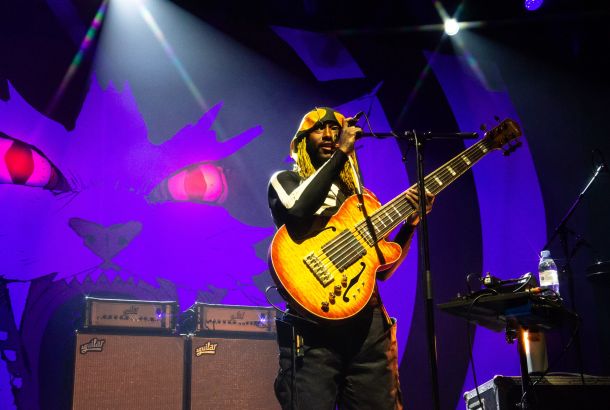Notorious B.I.G.’s “Ready to Die” – A Modern Feminist Masterpiece?
There’s been much written about the role of hip-hop as a cultural obstacle to feminism; a globally favoured genre that advocates misogyny verse after verse, rapper after rapper. Amongst the genre’s icons that are held up as examples of this is Biggie Smalls. I recently heard the album ‘Ready to Die’ for the first time, expecting exactly the kind of subject matter that is so often condemned as sexist. What I heard was something quite different and far more original—a partial new-wave feminist piece. This might sound as far-fetched as Kanye doing an album about rectal sensuality, but there are multiple moments throughout ‘Ready to Die’ that stand out for the fact they don’t fall into the typical misogynist discourse in hip-hop.
There are certain moments difficult to justify. Regardless of how pissed off they make him, the women in ‘Friend of Mine’ probably don’t deserve the hate Biggie’s offering. The initially censored line on ‘Gimme the Loot’ about robbing a woman even if she’s pregnant alongside the murder of another woman in a car sound pretty cold after 20 years. Violence towards women is indisputable, yet Biggie exerts just as much brutality on the male victims of his verbal spray—you certainly can’t accuse him of double standards. Rather than the discomfort felt when listening to say Eminem’s ‘Kim’, there’s a sense of indifference for anyone and everyone that gets in his way. Under Biggie’s rules, men and women are just as disposable as each other—equality, yay.
Violence is second to sex in this album and presented much more ambiguously. In ‘One More Chance’, Smalls promises that “Whether it’s stiff tongue or stiff dick/Biggie squeeze it to make shit fit”, proving himself to be a rather accommodating lover. Another line goes “I gotcha wishin’ for an intermission/Fuck the kissin, lickin down to your belly button, I ain’t frontin/they don’t call me B.I.G. for nuttin”, depicting a man who takes pride in his work, doing all that is necessary to leave no customer dissatisfied.
The ‘Fuck Me’ interlude—the predecessor to those video clips your friends send to you that unexpectedly turn into loud porn half way through—is literally the sound of Biggie’s female counterpart thoroughly enjoying herself for 90 seconds. She is clearly getting the most out of it as the 380-pound rapper tries to keep up. Since Donna Summer’s iconic orgasm, African-American women singers have long utilised sexuality for the sake of expressing independence and enjoyment. Rather than resisting the powerful force of feminine pleasure as a source of liberation, Biggie seems to condone it. The whole scene feels in no way derogatory; tongue-in-cheek it might be, but this break in the album suits the new-wave feminist value of sexual autonomy and reveals an unexpected side to Brooklyn’s finest.
‘Me and My Bitch’ is similarly surprising when you listen beneath the surface. The title and the line about “beating her right” doesn’t bode well, yet this is probably the most romantic track on the album despite the distressing outcome. We’ve got parity (“A real bitch is all I want… With a glock just as strong as me/Totin’ guns just as long as me”) as well as poignancy (“I swear to God I hope we fucking die together” … “They killed my best friend…”). We have an original depiction of a woman in a rap song; admired and adored by Biggie, a tragic heroine. The mourning nature of this song ultimately shows that even the Notorious B.I.G. can be moved by female companionship and undermines any orthodox misogyny he might be associated with.
A new-wave feminist perspective on the album could also make note of the masculinity in it. As men are increasingly engaged in equality and gender debates, issues like depression and fatherhood appear in discussion more. This album goes beyond the hyper-masculinity of typical hip-hop records. ‘Suicidal Thoughts’ is intense yet moving, as Biggie discusses the disappointment he’s caused the women in his life and gives in to his feelings. On the record’s anthem, ‘Juicy’, he explains that it is dedicated “to all the people that lived above the/buildings that I was hustlin’ in front of, when they called the police on/me when I was just tryin’ to make some money to feed my daughter/and all the niggaz in the struggle”. The extreme issues faced by black men in the 90s may radically contrast to those of new-wave male feminists—predominantly white—of today, but we can still recognise a degree of sensitivity towards men and their social challenges here. If he were alive today, Smalls would likely appreciate Kendrick’s ‘For Free?’ for its similar sentiments. The single father battling depression represents an honest response to the rapper stereotype Biggie is associated with, posing questions about the day to day problems of young men.
If you asked Biggie if he was a feminist, he’d probably shoot you. But on the evidence of this album, maybe he’s not the misogynist everyone always thought. His approaches to sex, love and masculinity all share similarities with modern new-wave feminist discourses and add another intriguing aspect to an already incredible piece. 19 years since his death, maybe we misunderstood the big man massively. Maybe…







